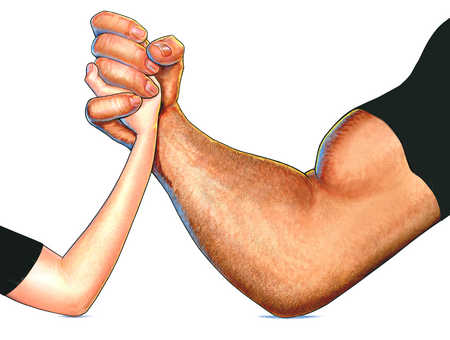 Our Tuesday morning men’s Bible study group is right in the middle of 1 Corinthians. Today it was chapter eight: Now, about food sacrificed to idols. The conversation in Scripture and in the church library this morning was all about strong brothers and weak brothers, disputable matters and matters of salvation, knowledge and love, freedom and stumbling blocks. Of course, the apostle Paul makes the whole thing rather clear in the first couple of sentences:
Our Tuesday morning men’s Bible study group is right in the middle of 1 Corinthians. Today it was chapter eight: Now, about food sacrificed to idols. The conversation in Scripture and in the church library this morning was all about strong brothers and weak brothers, disputable matters and matters of salvation, knowledge and love, freedom and stumbling blocks. Of course, the apostle Paul makes the whole thing rather clear in the first couple of sentences:
“We know that we all possess knowledge. Knowledge puffs up, but love builds up. The man who thinks he knows something does not yet know as he ought to know.”
Christian love is always the key. Always. No exceptions. Christ-like love. Considering others better than yourselves. Putting the needs of others ahead of your own. Love is more important than knowledge, even correct knowledge. Love is more important than right or wrong. Love, Paul says elsewhere in this letter, supercedes even hope and faith. Love is everything. And love, not knowledge, has to form the foundation of our Christian behavior.
Regarding our contemporary church issues, it’s much easier and requires much less thought and work to just issue blanket prohibitions of certain practices or to indiscriminately accept anything. The hard thing — the correct thing — is to maintain a proper perspective through Christian love. This way, Paul’s way, rings true. It makes much more sense in reality and according to God’s revelation in Christ.
Jerome Murphy-O’Connor writes about 1 Corinthians 8 in an article from 1978 entitled “Freedom or the Ghetto.”
“Through fear the Weak would have forced the community into a self-imposed ghetto. Through a destructive use of freedom the Strong would have committed the church to a pattern of behavior indistinguishable from that of its environment. If either group had prevailed, the identity and mission of the church would have been gravely compromised. Paul’s response was to focus the vision of the Corinthians on their roots in Christ and on their responsibility to each other and to a wider world. His passionate prudence is a perfect illustration of ‘love builds up.'”
Love is always at the center of Paul’s ethics. Without love, Paul maintains that all our spiritual blessings from God are worthless. And this love grows as Christians mature in the faith. The more we mature, the more we understand how little we measure up to God’s standards and how much depends on him and not us. That kind of humility naturally leads to the kind of love Paul’s writing about. Without it…
…the Christian who still thinks he knows something, doesn’t really know anything.
Peace,
Allan
Leave a Reply